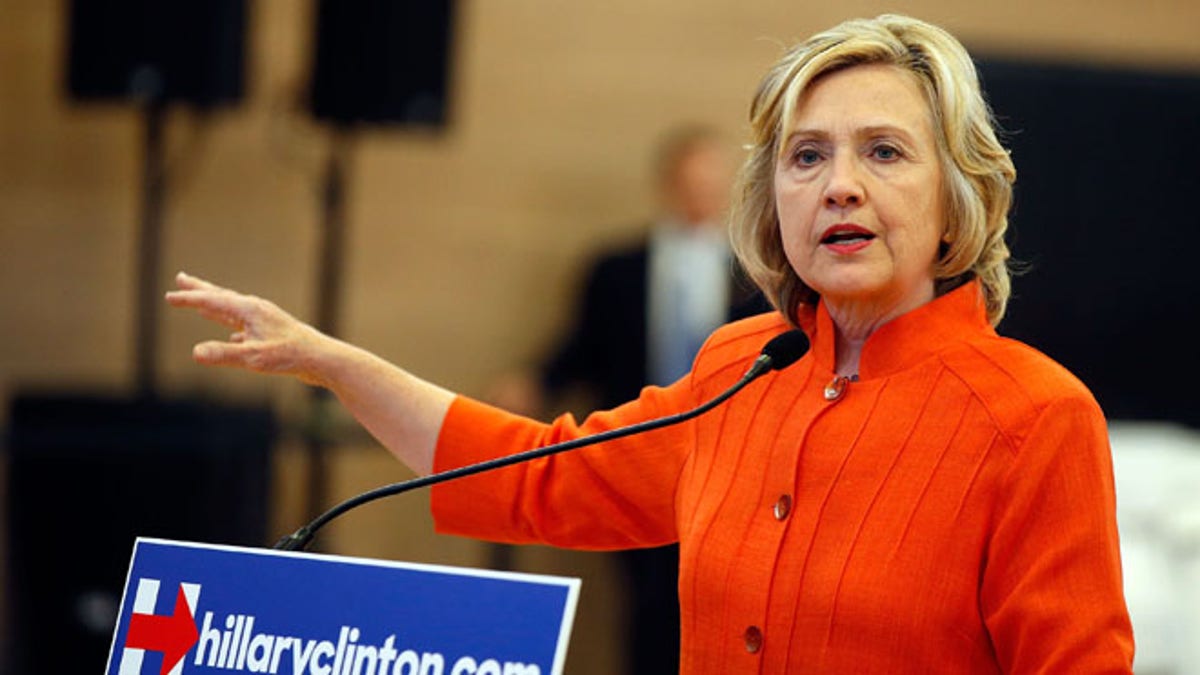
Hillary Clinton on August 18, 2015 in North Las Vegas, Nevada. (2015 Getty Images)
One of the most controversial aspects of President Barack Obama's Affordable Care Act (ACA) has become a major thorn in the sides of Democratic presidential hopefuls vying to secure the support of labor groups across the country.
The so-called "Cadillac Tax" – a 40 percent, non-deductible tax on employer-sponsored health coverage that takes effect in 2018 – has been a touchy subject for Democratic hopefuls like former Secretary of State Hillary Clinton and Vermont Sen. Bernie Sanders as they try to win over union members and some working-class groups that strongly oppose the tax, while also not alienating themselves from hardcore Obamacare supporters.
"This is something we do here often, particularly among labor groups," Emmy Ruiz, the Nevada state director for the Clinton campaign told Fox News Latino. "When we hold meetings with union members, yes, the Affordable Care Act comes up … we're looking at different options about what can be done."
Unlike many other western states, Nevada has a large union population, many of whom are Latinos working in the service and entertainment industry in places like Las Vegas and Reno. In Vegas, over half of the 55,000 members of the Culinary Union's Local 226 – arguably the state's most powerful labor group – are Hispanic.
While unions nationwide have traditionally been strong bases of support for the Democratic Party, it appears – at least at this early stage of the presidential campaign – that a candidate's stance on the Cadillac Tax could make or break his or her chance of winning the party's presidential nod.
"Health care is just so important," Laura Javier, a Local 226 member who works at Las Vegas' Bellagio Hotel and Casino, told FNL. "I'm very interested in everything that is going on with [ACA], and one thing I do not agree with is that we're being taxed 40 percent for our health insurance."
The tax is set to impose nationally a 40 percent levy on the cost of plans that exceed $10,200 for individual coverage and $27,500 for family coverage – the idea being to try to control rising health costs and to help pay for Obamacare. Employers will be able to get around the tax by replacing more expensive plans for cheaper ones with less coverage.
But opponents of the tax – which is an excise tax, meaning that employers will be able to incorporate its cost in the amount employees pay for their coverage – say it will affect huge numbers of people, as many as one-third to one-half of all employers by 2018, and it unfairly punishes older workers and those who live in areas where health care costs are higher.
The other big worry for unions is that the tax would drive-up monthly payments union members contribute to their collectively-bargained health plans.
"Every time we have a contract fight, that is probably our main issue with the companies," Javier said. "We really have to fight to get our health care incorporated into our contracts."
Despite heaping praise on the health-care policies of her former boss, Clinton finally made her position toward the tax known late in September. Following her announcement that as president she would rein in prescription drug costs and lower out-of-pocket health care costs, she called for a repeal of the Cadillac Tax.
"Too many Americans are struggling to meet the cost of rising deductibles and drug prices," said the Democratic frontrunner in a statement. "That's why, among other steps, I encourage Congress to repeal the so-called Cadillac Tax, which applies to some employer-based health plans, and to fully pay for the cost of repeal," it read.
Sanders, who according to the latest average of polls has 27.6 percent of the primary vote compared to Clinton's 40.8 percent – and former Maryland Gov. Martin O'Malley have both been vocal opponents of the tax, but many have questioned their viability as candidates in the general election.
Clinton's proposal was well received by the president of the Laborers' International Union of North America, Terry O'Sullivan, who said he was happy to see that candidates on both sides of the political divide are in favor of repealing the tax.
"We're encouraged that all of the Democratic candidates for president and a growing bipartisan movement in Congress are working to repeal the tax before its implementation in 2018," O'Sullivan said, according to Reuters.
While almost all of the Republican candidates support doing away with the ACA, there is one facet of the legislation that has actually gained a measure of support among the crowded GOP field: the Cadillac Tax.
A recent health care proposal by former Florida Gov. Jeb Bush – and a similar one by Florida Sen. Marco Rubio – is only slightly different from the Cadillac Tax: it imposes normal payroll and income taxes on health care plans costing over $12,000 for individuals and $30,000 for families. The general effect of pushing employers to offer less expensive plans by taxing them like wages is essentially the same.
Which isn't to suggest that Bush and Rubio wouldn't face opposition to the Cadillac Tax from within their own party.
Republicans in Congress have consistently identified the tax as one of ACA's most problematic features. Orrin Hatch, the chairman of the Senate Finance Committee, and Chuck Grassley, the chairman of the Senate Judiciary Committee, wrote a letter to the White House earlier this year declaring the provision a "draconian policy," according to the New York Times.
With the tide shifting in the Clinton campaign over the Cadillac Tax, it appears that securing the union vote across the country is more important than backing the Obama administration when it comes to the ACA.
"The message that people in the unions are upset about the Cadillac is being heard," David Damore, associate professor of political science at the University of Nevada, Las Vegas, told FNL. "And they matter a lot."




